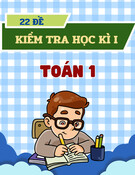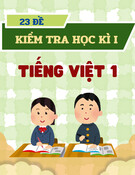
UBND THÀNH PHỐ KON TUM
TRƯỜNG THCS TRẦN HƯNG ĐẠO
MA TRẬN ĐỀ KIỂM TRA CUỐI KỲ 1
MÔN: TIẾNG ANH LỚP 8 - THỜI GIAN LÀM BÀI: 60 PHÚT
TT
Kĩ năng
Mức độ nhận
thức
Tổng
Nhận biết
Thông hiểu
Vận dụng
Vận dụng cao
Tỉ lệ
(%)/câu
Thời gian
(phút)
Tỉ lệ
(%)/câu
Thời
gian
(phút)
Tỉ lệ
(%)/câu
Thời
gian
(phút)
Tỉ lệ
(%)/câu
Thời gian
(phút)
Tỉ lệ (%)/câu
Thời gian
(phút)
1
Listening
12,5 %
5 câu
3
7,5 %
3 câu
4
20 %
8 câu
7
2
Language
12,5%
5 câu
6
2,5 %
1 câu
2
5%
2 câu
4
20 %
8 câu
12
3
Reading
10 %
4 câu
6
5 %
2 câu
3
5 %
2 câu
4
20 %
8 câu
13
4
Writing
10 %
4 câu
6
10 %
4 câu
7
20 %
8 câu
13
Total (Written
Test)
35 %
14 câu
15
25 %
10 câu
15
20%
8 câu
15
80 %
32 câu
(28 TN + 4 TL)
45
5
Speaking
5%
4
5 %
4
10 %
7
20 %
15
Tổng
40 %
19
30 %
19
20 %
15
10 %
7
100%
60
Tỉ lệ (%)
40
30
20
10
Tỉ lệ chung
(%)
70
30

BẢNG ĐẶC TẢ KỸ THUẬT ĐỀ KIỂM TRA CUỐI KỲ 1 - LỚP 8
TT
Kĩ năng
Đơn vị kiến thức/ kỹ
năng
Mức độ kiến thức, kỹ năng cần
kiểm tra đánh giá
Số câu hỏi theo mức độ nhận thức
Tổng
Nhận biết
Thông hiểu
Vận dụng
Vận dụng
cao
TN
TL
TN
TL
TN
TL
TN
TL
TN
TL
I
Listening
1. T/F
- Nghe một đoạn văn/ độc
thoại khoảng 1.5 phút
(khoảng 140 - 160 từ) về
chủ đề Ethnic groups of
Viet Nam.
- Học sinh trả lời câu hỏi
bằng cách chọn phương án
đúng/ sai.
Nhận biết:
- Nghe lấy thông tin chi tiết về:
+ số lượng
+ thời gian
+ ngữ cảnh
+ sự kiện
+ nơi chốn
+ tên người/ địa danh
3
3
Thông hiểu:
- Hiểu được nội dung chính của
đoạn độc thoại để chọn câu trả lời
đúng sai (True/ False).
1
1
Vận dụng:
- Từ nội dung của bài đưa ra nhận
định đánh giá suy ra được nội
dung.
- Sử dụng được các chi tiết đúng
loại trừ các chi tiết sai để chọn
đáp án.
2. Gap filling/MCQs
- Nghe một đoạn văn/ độc
thoại (khoảng 140 - 160 từ)
1.5 phút về chủ đề Our
customs and traditions.
Nhận biết:
- Nghe lấy thông tin chi tiết về: vị
trí, địa điểm, thời gian…
2
2
Thông hiểu:
- Hiểu được nội dung chính của
đoạn độc thoại về chủ đề để điền
thông tin còn thiếu vào chỗ trống
(gap-filling) hoặc/ và chọn thông
tin đúng để trả lời câu hỏi
(MCQs).
2
2
Vận dụng: Trắc nghiệm khách
quan 4 đáp án/ điền từ vào chỗ
trống

- Tổng hợp thông tin từ nhiều chi
tiết, loại trừ các chi tiết sai để
chọn đáp án đúng.
(Lưu ý: 4 lựa chọn các phương án
nhiễu cần khác biệt rõ ràng với
đáp án đúng về âm, số...)
II
Language
1. Phonology
- Sounds /ə/ and /ɪ/
- Stress in two syllable
words
Nhận biết:
+ Sounds /ə/ and /ɪ/
+ Trọng âm của các từ có 2 âm
tiết thông qua các từ vựng quen
thuộc.
2
2
Thông hiểu: Kiểm tra tích hợp ở
nội dung nghe
Vận dụng: Kiểm tra tích hợp ở
nội dung nói
2. Vocabulary
Dạng câu hỏi MCQs
Các từ vựng đã học theo
chủ điểm:
- Leisure time
- Life in the countryside
- Teenagers
- Ethnic groups of Viet
Nam
- Our customs and
traditions
- Lifestyles
Nhận biết:
- Từ/ cụm từ trong sách giáo
khoa.
1
1
Thông hiểu:
- Hiểu và phân biệt được các từ
vựng theo chủ đề đã học.
- Nắm được mối liên kết và kết
hợp từ trong bối cảnh và ngữ cảnh
tương ứng.
1
1
Vận dụng:
- Cấu tạo từ, sử dụng từ phù hợp
với văn cảnh (danh từ, tính từ,
động từ, trạng từ…); từ đồng
nghĩa, trái nghĩa
2
2
3. Grammar
Các chủ điểm ngữ pháp đã
học:
- Verbs of linking
- Comparative forms of
adverbs
- Simple sentences and
compound sentences
Nhận biết:
- future simple
2
2
Thông hiểu:
- Biết cách sử dụng câu liên từ
trong ngữ cảnh.
- Biết cách sử dụng câu điều kiện
loại 1

- Yes/ No questions
- Countable nouns and
uncountable nouns
- Zoro article
- Future simple
- First conditional
Vận dụng:
- Vận dụng những điểm ngữ
pháp đã học vào bài viết / nói /
nghe / đọc.
III
Reading
1. Cloze test
Hiểu được bài đọc có độ dài
khoảng 150 - 180 từ về chủ
điểm đã học:
- Ethnic groups of Viet
Nam
Nhận biết:
Nhận ra được các thành tố ngôn
ngữ và liên kết về mặt văn bản
3
3
Thông hiểu:
- Nghĩa của từ trong ngữ cảnh
phù hợp.
- Loại từ
Vận dụng:
- Phân tích mối liên kết giữa các
câu trong văn bản để chọn liên từ
phù hợp. (because)
1
1
2. Reading
comprehension
Hiểu được nội dung chính
và nội dung chi tiết đoạn
văn có độ dài khoảng 150 -
180 từ, về chủ điểm: Our
customs and traditions
Nhận biết:
- Thông tin chi tiết về địa điểm,
thời gian, cách thức…
1
1
Thông hiểu:
- Hiểu ý chính của bài đọc và
chọn câu trả lời phù hợp.
- Hiểu được nghĩa tham chiếu.
- Loại trừ các chi tiết để đưa ra
câu trả lời phù hợp.
- Từ đồng nghĩa
2
2
Vận dụng:
- Đoán nghĩa của từ trong văn
cảnh.
- Hiểu ngụ ý tác giả.
1
1
Vận dụng cao
- Thể hiện quan điểm cá nhân về
nội dung bài đọc.
(Tích hợp vào kiểm tra kỹ năng
viết)

IV
Writing
1. Sentence
transformation
Thông hiểu:
- Viết lại câu sử dụng dạng so
sánh.
- Viết lại câu điều kiện.
- Viết câu sử dụng verbs of
linking.
- Viết câu với conjuntions.
4
4
2. Sentence building
Sử dụng từ/ cụm từ gợi ý
và các cấu trúc đã học để
viết thành câu hoàn chỉnh
Vận dụng:
- Sử dụng các cấu trúc và từ
vựng đã học để viết câu hoàn
chỉnh
4
4
Tổng bài viết
14
10
4
4
28
4
V
Speaking
1. Self-introduction
Giới thiệu bản thân
- Nhận biết và hiểu cách trả lời
thông tin cơ bản như tên, tuổi,
lớp, sở thích cá nhân…
5%
5%
2. Topic speaking
Trình bày 1 bài nói cá nhân
(đã có thời gian chuẩn bị
trước khi nói) về một trong
số những chủ đề liên quan
đến bài từ 1 đến bài 6
Vận dụng: Sử dụng từ vựng và
cấu trúc linh hoạt, diễn tả được
nội dung cần nói theo những
cách khác nhau.
Phát âm tương đối chuẩn
5%
5%
3. Q&A
Vận dụng cao: Hiều và trả lời
được câu hỏi của GK và trả lời 1
cách linh hoạt. Sử dụng ngôn
ngữ 1 cách tự nhiên và thuần
thục
10%
10%
Tổng phần nói
5%
5%
10%
20 %
Tổng
14
(35
%)
5%
10
(25
%)
5%
4
(10
%)
4
(10
%)
(10
%)
28
TN
(70%
)
4 câu
(10%)
Speak
(20%)
Tổng chung
40
30
20
10
70
30






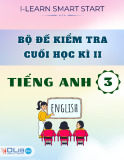
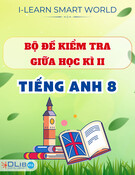
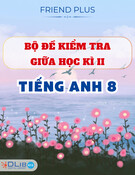
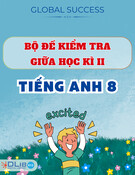
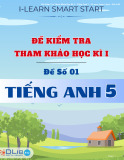

![Đề thi Tiếng Anh có đáp án [kèm lời giải chi tiết]](https://cdn.tailieu.vn/images/document/thumbnail/2025/20250810/duykpmg/135x160/64731754886819.jpg)
